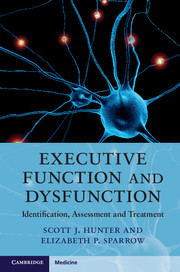Book contents
- Frontmatter
- Contents
- Editor biographies
- List of Contributors
- Preface
- Acknowledgments
- Introduction
- Section I Foundations of Executive Function/Dysfunction
- Chapter 1 Models of executive functioning
- Chapter 2 The developmental neuropsychology of executive functions
- Chapter 3 The neurobiology of executive functions
- Chapter 4 Assessment and identification of executive dysfunction
- Section II Executive Dysfunction in the Neurodevelopmental and Acquired Disorders
- Section III Applications
- Appendix 1 Abbreviations used in the book
- Appendix 2 Tests/tasks referenced in the book
- Index
- References
Chapter 2 - The developmental neuropsychology of executive functions
from Section I - Foundations of Executive Function/Dysfunction
Published online by Cambridge University Press: 05 October 2012
- Frontmatter
- Contents
- Editor biographies
- List of Contributors
- Preface
- Acknowledgments
- Introduction
- Section I Foundations of Executive Function/Dysfunction
- Chapter 1 Models of executive functioning
- Chapter 2 The developmental neuropsychology of executive functions
- Chapter 3 The neurobiology of executive functions
- Chapter 4 Assessment and identification of executive dysfunction
- Section II Executive Dysfunction in the Neurodevelopmental and Acquired Disorders
- Section III Applications
- Appendix 1 Abbreviations used in the book
- Appendix 2 Tests/tasks referenced in the book
- Index
- References
Summary
The predominant view regarding EF among clinical and research neuropsychologists has historically been one of modularity. As a result, EF skills have been most commonly equated with frontally-focused neural systems that are presumed to drive and regulate their performance. Consequently, it is a still popular belief within the field of neuropsychology that EF skills are best characterized as a set of control capabilities that only fully emerge as an individual achieves adult maturity. This belief holds despite the exponential growth of developmental neuropsychology and the empirical literature addressing developmental evidence of EF. Although the research has shown that it is risky to extrapolate from adult models of brain function to patterns of neural development and consequent behavior in children, there remains a tendency to do so, particularly with regard to EF.
A corollary belief is that effective EF is achieved by late adolescence or early adulthood when neural systems directed by the frontal lobes are reaching their final period of myelination and adult patterning. While this belief is increasingly understood as developmentally erroneous, given that some EF skills reach adult levels of performance at younger ages, it serves as a reminder that much in neuropsychology remains adult “privileged” in theories and models. This impacts how we can guide “real” thinking about EF skills and their expression at varying points in development.
Information
- Type
- Chapter
- Information
- Executive Function and DysfunctionIdentification, Assessment and Treatment, pp. 17 - 36Publisher: Cambridge University PressPrint publication year: 2012
References
Accessibility standard: Unknown
Why this information is here
This section outlines the accessibility features of this content - including support for screen readers, full keyboard navigation and high-contrast display options. This may not be relevant for you.Accessibility Information
- 11
- Cited by
